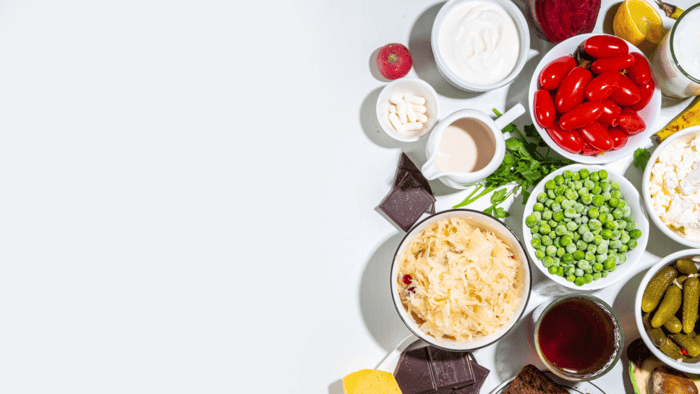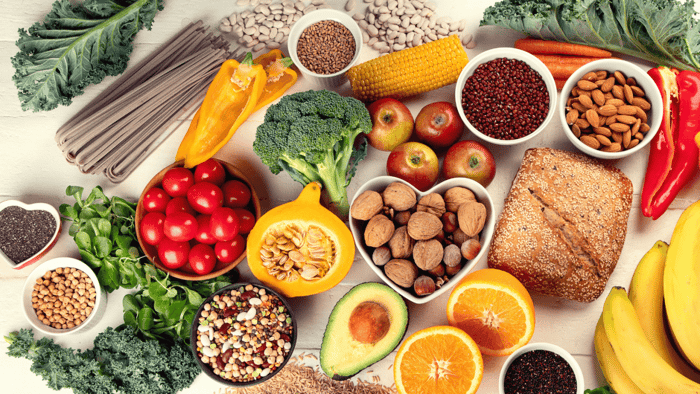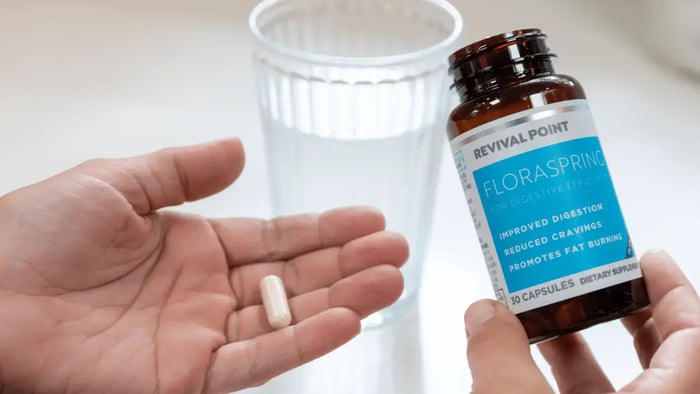Probiotics, prebiotics, symbiotics… All these biotics can make it difficult to know what’s truly good for your gut health and what isn’t.
And the reality is, taking a supplement you don’t actually need can do more harm than good to your digestive system! So how do you know which is which and what you need? We’re exploring the topic today to help you make an informed decision.
Prebiotic vs Probiotic: The Main Difference
Apart from the single-letter difference in their names, there’s quite a large difference between prebiotics and probiotics. For it to make sense, we must first understand what probiotics are in order to understand their relationship with prebiotics.
Probiotics
Probiotics are living bacteria in your gut. Yes, it sounds creepy, but they’re necessary for your digestive health! They’re the good bacteria that help to maintain a balance of health in your gut microbiome and fight off the bad bacteria that cause digestive issues (1).
Prebiotics
Prebiotics are insoluble fibers that your body can’t digest, but that act as food for the probiotic bacteria in your gut. Unlike probiotics, they aren’t living organisms, but they’re just as important as probiotics—they strengthen probiotics to be able to fight off nasty bad bacteria (2).

Which One Should You Take?
Correct probiotic use actually varies from person to person. But while technically you need both probiotics and prebiotics for your digestive system to function smoothly, that doesn’t mean you need to take supplements for both.
In most cases, you can get the prebiotics you need from your food (which we’ll dive into further down). If you do suffer from gut problems, it’s more likely that a probiotic supplement will be a better help, although we highly recommend checking with your doctor before starting one.
Here are some of the most common symptoms that indicate a need for some digestive health help:
- Irregular bowel movements
- Slow, sluggish metabolism
- Bloating and gassiness
- Abdominal discomfort or pain
- Newly-developed food allergies
- Out-of-control sugar cravings
- Beaten-down immune system
- Skin rashes or eczema
- Unexplained bad mood
- Irritable bowel syndrome
- Recent antibiotic use
Can You Take Both?
It can be tricky and a little dangerous for your gut health to buy a probiotic supplement and a different prebiotic supplement and take them both. Not all probiotic bacteria eat all prebiotic fiber—just like humans have preferences, so do different strains of bacteria.
Buying two random supplements is a shot in the dark… Your gut bacteria may not eat the prebiotic fibers you’re ingesting!
The other potential problem is that prebiotics doesn’t just feed the good guys. They feed both good and bad bacteria. This means that while some of your beneficial bacteria may not be eating the prebiotics you’re adding, the bad bacteria could be feasting on it and growing stronger.
If you do want or need to take them together, we recommend either getting your doctor’s advice on which ones to use or choosing a symbiotic. This is a pre-mixed combination of probiotics and prebiotics, which takes all the guesswork out of it for you (3).
Researchers, microbiologists, and pharmacists have already matched the type of bacteria with its preferred food, so you can rest assured it should be quite effective.
The Best Synbiotic Combo: Click Here Now to Check It Out
Who Shouldn’t Take Probiotics or Prebiotics?
While probiotics are an important and essential part of your digestive system, not everyone should be taking them as a supplement. Consult your doctor before taking them if you:
- Suffer from an immune system disorder
- Have been diagnosed with a serious health condition
- Have recently had any kind of surgery
Prebiotic vs Probiotic Supplements & Foods
You can get both probiotics and prebiotics from foods or supplements. In many cases, we don’t quite get enough probiotics from our food sources, but prebiotics is easier to come by. This means, as long as your diet is in check, chances are you won’t need prebiotic supplements.
If you’re interested in tweaking your diet to help improve your gut microbiota, here are the foods you should consider eating more of!
Probiotic Foods
The best way to get more good bacteria into your system is to consume it in fermented or cultured foods. These may include:
- Yogurt
- Kombucha
- Kimchi
- Sauerkraut
- Kefir
- Tempeh
- Pickles
- Any pickled foods
Prebiotic Foods
Eating a healthy diet usually provides you with all the prebiotics you need. Starchy foods in particular offer a good dose of them. As long as you eat a good amount of:
- Fruits
- Vegetables
- Whole grains
You should get more than enough prebiotics into your system. Some more specific foods that are unusually high in prebiotic fiber include:
- Under-ripe bananas (high in resistant starch)
- Apples & pears
- Blueberries
- Watermelon
- Nectarines
- Potatoes (boiled and cooled are extra high in starch)
- Jerusalem artichokes
- Garlic & onions
- Asparagus
- Chicory root
- Yacon root
- Dandelion greens
- Mushrooms
- Oats
- Barley
- Wheat bran
Brand New: The Best (Doctor-Recommended) Probiotic on the Market

Conclusion
The prebiotic vs probiotic argument is more about confusion than anything else. Both have their place and both perform very important jobs in the gut. We can also get both from the food we eat, although it’s tricky to know exactly how much you’re getting and if it’s enough.
If you’ve been struggling with gut health, it’s worth paying a visit to your doctor before deciding to go on one or the other. Taking a supplement when you don’t need it can cause worse symptoms!





